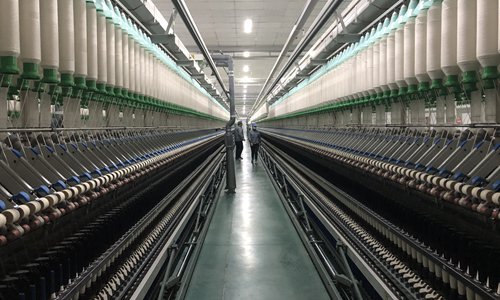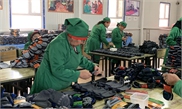SOURCE / INDUSTRIES
Some Xinjiang textile exports to Europe freeze as virus cases rise abroad

A production line in a yarn factory in Aksu Photo: Liu Xin/ GT
About 60 percent of the textile manufacturers in Northwest China's Xinjiang Uygur Autonomous Region have resumed production, yet many of their export orders to European clients are in limbo due to logistics issues following fast-growing confirmed coronavirus cases overseas.Local industry players lamented that the rising cost of medical supplies - which sometimes mount to 8,000 yuan ($1,153.29) a day for big manufacturers - as well as a delay in the delivery of spring and summer outfits, could lead to rising stockpiles, squeezing their profitability.
At Aksu Textile Industrial Park in Aksu Prefecture, Xinjiang's largest textile park, about 60 percent of the textile companies have reopened so far, a manager of the park's committee surnamed Liu told the Global Times on Wednesday.
A total of 4,056 local workers have returned, with some taken on special buses arranged by the local government for them, according to Liu.
But some skilled workers who hold key positions in production, most of whom are from outside Xinjiang, are still unable to return or are still undergoing 14-day quarantine procedures, Zhao Hong'gen, manager of a clothing factory in Aksu, told the Global Times on Wednesday.
"Only about 300 workers, out of the total 700, have returned. The output now is about 30-40 percent of our normal capacity," Zhang Jie, general manager of Xinjiang Jinliyuan Clothing Co, told the Global Times on Tuesday.
He estimated that it may take a month or so for production to bounce back to normal, depending on his upstream supplies and how many workers will be able to return by March.
As part of an ongoing effort to help stabilize production, authorities in Aksu launched online recruitment fairs for local companies on Tuesday, officials said. Other supportive measures also include distributing medical supplies to local companies for free and providing subsidies to affected enterprises.
The coronavirus is gradually coming under control in China, a good sign for Xinjiang textile companies to source raw materials outside, according to Zhao. However, local companies are still finding it hard to ship export orders due to growing confirmed coronavirus cases overseas, in particular in Europe - their main export destination.
"Some Xinjiang manufacturers' exports to Italy have stopped as some Italian cities are in a lockdown. We also sent some clothing samples to our clients in Germany and are awaiting their approval so that we can begin mass production. But they haven't responded. Everything moves so slowly during the outbreak," Zhang complained.
In 2019, Xinjiang exported 38.95 billion yuan of textile and clothes, according to data released by local customs.
A number of local manufacturers also took note of soaring daily costs for medical supplies, including masks and disinfectants. Zhang, whose company is one of the largest at the industrial park, said he needs to spend 7,000 yuan to 8,000 yuan a day to meet the epidemic prevention requirements of local regulators.
"This is a huge cost, considering we lost revenue of up to 3 million yuan in February," Zhang said. He added that clothing is a seasonal industry, and any delay in production would mean out-of-season styles and skyrocketing stockpiles.


